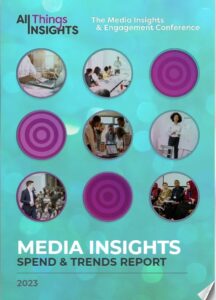Before the start of the pandemic, consumer insights models relied heavily on extrapolation, but what exactly does that mean? Extrapolation is a fancy industry term that essentially describes exactly how we actually predict the future, by looking at the past. In a perfect world, we’d all follow basic buying habits and trends. As long as nothing major disrupts our daily lives, we can all be expected to do and buy the same things with a predictable frequency. A large part of collecting consumer insights is comparing your level of production and the number of units sold to the overall demand of your audience and tracking the trends.
Let’s say you’re the executive director of a growing tech company called ABC Tech. You’re concerned because it looks like the sales for ABC Tech are on a downward trend. It seems like no matter what you do, you can’t seem to make more sales and boost your bottom line. What should you do? Look at the data, of course! So you ask your research department to produce a new app that will follow increasing demand as you increase production. Your team noticed that since this is a new and cheap product, in the beginning, it should follow a linear demand, at least until a certain point.
Before the pandemic, businesses relied heavily on “demand forecasting” because it allowed businesses to optimize their inventory, software, or services by predicting future sales, based on past trends. For ABC Tech, all you would need to do is thoroughly analyze all of your historical sales data, and then make an informed decision.
Since ABC Tech is in SaaS (software as a service), you won’t be focusing on things like warehousing needs and order fulfillment to meet customers’ expectations. Instead, you’d be focusing on your “bookings,” which is the number of contracts signed with a prospective customer during a specified time frame. Bookings are crucial because it helps you estimate all of the revenue ABC Tech has won in sales. And don’t forget your Monthly Recurring Revenue (MRR), which sounds just like what it is, the predictable revenue you earn each month for all of your active subscriptions. That’s not to say there isn’t any more nuance, but that’s the big picture. Now, what’s changed?
According to Gans, the pandemic was so disruptive that businesses are moving away from relying on extrapolation and demand forecasting, alone. “First of all, we need to look further back to have a stronger data set to build on. Secondly, We’re teaching ourselves to think in terms of scenarios instead of just thinking extrapolation. And that is a big change for my function,” remarked Gans. What does that mean for ABC Tech and other businesses in the coming year? Well, it means things might be tenuous, at first, before everyone hits their stride. We know, now more than ever, that we can’t predict the future, which can make us all a bit nervous. But by centralizing your data, analyzing your pipeline, and also planning for future scenarios, you are positioning your brand to succeed. In fact, Gans concludes, all good customer insights must “ inspire, enable and optimize.” As long as you can commit to that, then you’ll be in a strong position to gain market share now and in the future.
Contributors
-

Seth Adler heads up All Things Insights & All Things Innovation. He has spent his career bringing people together around content. He has a dynamic background producing events, podcasts, video, and the written word.
View all posts -
























































































































































































